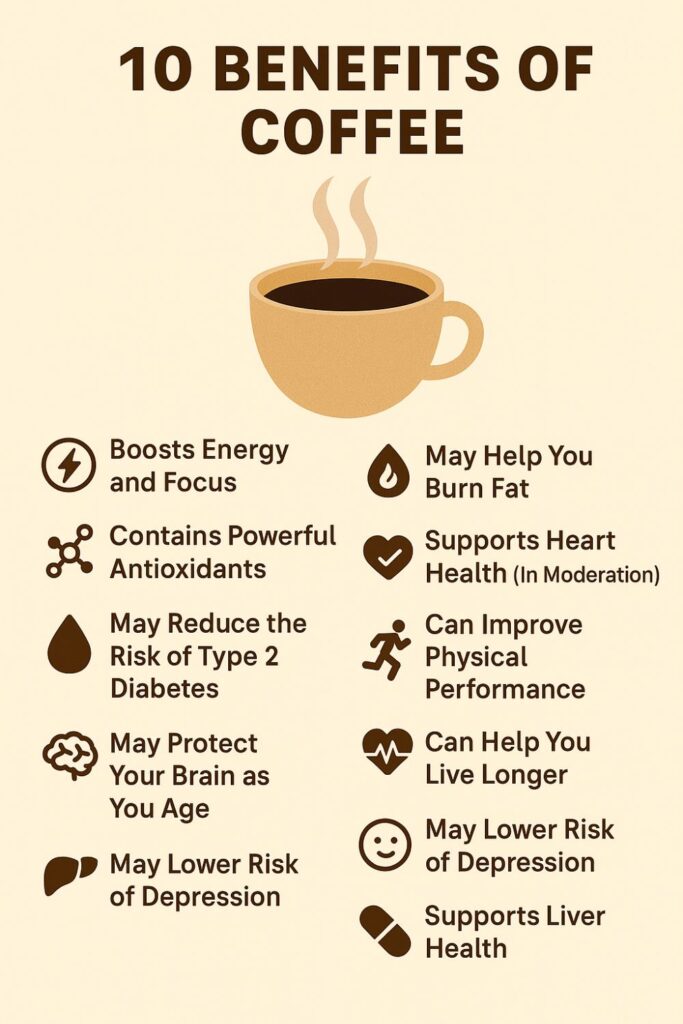Table of Contents
Coffee isn’t just your morning fuel. It’s a warm hug in a mug, a productivity booster, and for many people, a non-negotiable part of daily life. But beyond waking you up, coffee comes with a list of impressive health and lifestyle benefits that are too good to ignore.
If you’re someone who looks forward to your cup (or three) of coffee every day, you’re in for a treat. Let’s dive into ten science-backed benefits of coffee that might just make you appreciate your brew even more.

1. Coffee Boosts Your Energy and Focus
Let’s start with the obvious. You already know coffee gives you energy, but do you know how?
- Caffeine is the key ingredient that helps stimulate your brain.
- It blocks a chemical called adenosine, which makes you feel tired.
- As a result, you feel more alert, focused, and ready to take on the day.
Whether you’re working, studying, or just trying to get through a busy morning, a cup of coffee can help you power through.
Many people report improved concentration and reaction time after drinking coffee. That’s why it’s often the go-to drink for people who need to stay sharp and productive.
Quick Tip: Want a brain boost without overdoing it? Try having coffee 30 minutes before a task that needs focus.
2. Coffee May Help You Burn Fat
Did you know that coffee can actually help with fat burning?
- Caffeine is found in almost every fat-burning supplement, and that’s not just by chance.
- It helps boost your metabolism and can increase fat oxidation.
- Studies show that caffeine may improve your ability to burn fat by 10 to 29% depending on your body type and caffeine tolerance.
Now, this doesn’t mean coffee is a magic weight-loss potion. You still need to move your body and eat well. But drinking coffee especially black coffee with no sugar or cream can support your weight goals.
Here’s how coffee helps with fat burning:
- Increases adrenaline levels, which helps release fat stores.
- Encourages your body to use fat for energy during physical activity.
- May reduce feelings of hunger in some people.
If you’re someone who’s trying to shed a few pounds, consider having coffee before a workout. It might just give you that extra push.

3. Coffee Contains Powerful Antioxidants
Here’s something you may not know: coffee is one of the biggest sources of antioxidants in a regular person’s diet.
- Antioxidants help your body fight free radicals unstable molecules that can cause damage to your cells.
- Over time, free radicals contribute to aging and diseases like cancer and heart disease.
Coffee contains important antioxidants like:
- Chlorogenic acid, which may help with inflammation and blood sugar control.
- Melanoidins, which have anti-bacterial and antioxidant properties.
In fact, studies have shown that many people get more antioxidants from coffee than from fruits and vegetables combined.
So while you should still eat your greens, your morning brew is doing a little more behind the scenes than just waking you up. Think of it as a tiny daily shield for your cells.
4. Coffee May Reduce the Risk of Type 2 Diabetes
One of the most impressive health benefits of coffee? It may help lower your risk of type 2 diabetes.
Here’s what research says:
- People who drink several cups of coffee a day are less likely to develop type 2 diabetes.
- Some studies suggest up to a 30 to 50% lower risk depending on the amount consumed.
So how does coffee help?
- It may protect the beta cells in your pancreas, which are responsible for producing insulin.
- The antioxidants in coffee may also reduce inflammation and improve insulin sensitivity.
Both caffeinated and decaf coffee appear to have this benefit, so if you’re sensitive to caffeine, decaf is still a great option.
Of course, this doesn’t mean you should load your coffee with sugar and whipped cream. Keep it simple and enjoy it as part of a healthy routine.
5. Coffee Supports Heart Health (In Moderation)
Coffee and heart health? It may sound surprising, but studies are showing some good news.
- Drinking 2 to 4 cups of coffee per day is linked to a lower risk of heart disease and stroke.
- Some research suggests coffee may improve blood vessel function and reduce inflammation.
Here’s how moderate coffee drinking can help your heart:
- Improves blood circulation.
- May help maintain healthy blood pressure.
- Supports better cholesterol balance.
Now, moderation is key here. Too much caffeine can lead to jitters, anxiety, or a rapid heartbeat in some people. So it’s important to listen to your body.
If you’re sensitive to caffeine, try limiting yourself to one or two cups per day or switching to half-caff or decaf.
Pro Tip: Add a splash of unsweetened almond milk or cinnamon instead of sugary creamers to keep your heart-friendly coffee truly healthy.

6. Coffee Can Improve Your Physical Performance
There’s a reason so many athletes drink coffee before hitting the gym.
Caffeine:
- Increases adrenaline levels, prepping your body for physical activity.
- Encourages your body to use fat stores for energy, helping with endurance.
Studies show that caffeine can improve physical performance by 11 to 12%, especially in endurance sports like running, biking, or swimming.
Here’s what it means for you:
- You might run a little farther or lift a bit heavier.
- You’ll feel less tired during workouts.
- You’ll recover quicker thanks to increased blood flow.
Many people also find that coffee puts them in a better mental state for exercise. It sharpens focus, boosts mood, and reduces that “I don’t feel like it” feeling.
So next time you’re getting ready for a workout, consider having a cup of coffee 30 to 60 minutes before exercise. It might give you that little boost you need to go harder and feel better afterward.
7. Coffee May Protect Your Brain as You Age
This is a big one. Coffee may help reduce the risk of neurodegenerative diseases, like:
- Alzheimer’s disease
- Parkinson’s disease
Both of these conditions are linked to the aging brain, and unfortunately, there’s no cure yet. But research shows that coffee drinkers have a much lower risk of developing these diseases.
Here’s how coffee may help your brain:
- Boosts dopamine production, which is important for brain function.
- Reduces inflammation and oxidative stress.
- Supports better memory and concentration over time.
Several long-term studies found that regular coffee drinkers were up to 65% less likely to develop Alzheimer’s. For Parkinson’s, caffeine appears to have a protective effect by helping preserve dopamine levels.
If brain health is something you’re thinking about (or worried about), your daily coffee habit could actually be helping more than you realize.

8. Coffee Can Help You Live Longer
Believe it or not, coffee drinkers may actually live longer.
Multiple studies have shown a connection between coffee consumption and reduced risk of death from various causes, including:
- Heart disease
- Stroke
- Diabetes
- Respiratory illness
- Infections
So how does this work?
- Coffee is loaded with protective compounds and antioxidants.
- It helps regulate many functions in your body from your liver to your brain.
- It can even boost your mood, which supports mental well-being over the long term.
A 2022 study published in the Annals of Internal Medicine found that people who drank 2 to 3 cups of coffee daily were 12 to 20% less likely to die during the study period compared to non-coffee drinkers.
Of course, living longer depends on many factors your diet, exercise, sleep, and genetics. But your coffee habit may be doing more good than you thought.
9. Coffee May Lower Risk of Depression
Let’s talk about mental health. Coffee isn’t a replacement for therapy, medication, or support—but it might help you feel more uplifted.
Studies show that people who drink coffee regularly are less likely to experience depression.
Here’s why:
- Caffeine stimulates the release of dopamine and serotonin, two feel-good brain chemicals.
- Coffee may have a mood-boosting effect, especially when enjoyed as part of a daily routine.
- It can also help reduce feelings of fatigue and brain fog, which often accompany low moods.
One study by Harvard researchers found that women who drank 4 or more cups of coffee daily had a 20% lower risk of depression.
And let’s not forget the social aspect. Sharing a cup of coffee with a friend, chatting at a café, or even just taking a quiet moment for yourself can all support better mental wellness.

10. Coffee Supports Liver Health
Your liver does a lot for you—detoxifying your body, processing nutrients, and managing hormones. Coffee can actually help protect it.
Research shows that people who drink coffee are less likely to develop liver diseases like:
- Fatty liver disease
- Liver fibrosis
- Cirrhosis
- Liver cancer
Here’s how coffee supports your liver:
- Reduces fat buildup in the liver.
- Lowers inflammation.
- Helps maintain healthy liver enzyme levels.
One study found that drinking 2 to 3 cups per day was linked to a 38% lower risk of liver cancer and a 46% lower risk of liver death.
Both regular and decaf coffee seem to offer benefits, but the effect may be stronger with caffeinated versions. So next time you’re enjoying your coffee, know that your liver is quietly thanking you.
FAQs About Coffee and Health
Q: How much coffee is too much?
Most experts agree that 3 to 4 cups per day is generally safe for healthy adults. Too much caffeine can cause sleep problems, anxiety, or an upset stomach.
Q: Is black coffee the healthiest option?
Yes, black coffee has zero calories and no sugar or fat. Adding milk is fine, but keep sugary creamers and syrups to a minimum.
Q: What about decaf? Does it offer the same benefits?
Decaf coffee contains fewer antioxidants and less caffeine, but it still provides some health benefits, especially for liver and brain health.
Q: Can coffee cause dehydration?
Not really. While caffeine is a mild diuretic, the water content in coffee helps you stay hydrated.
Final Thoughts: Enjoy Your Coffee Mindfully
There you have it. 10 amazing benefits of coffee that go beyond just keeping you awake. From boosting your mood and energy to protecting your brain, heart, and liver, coffee really does a lot for your body.
Of course, like anything, moderation is key. Listen to your body, skip the sugary add-ons, and enjoy your coffee in a way that works for you.
So the next time you sip your brew, do it with a little more appreciation. You’re not just enjoying a tasty drink you’re supporting your health in more ways than one.

